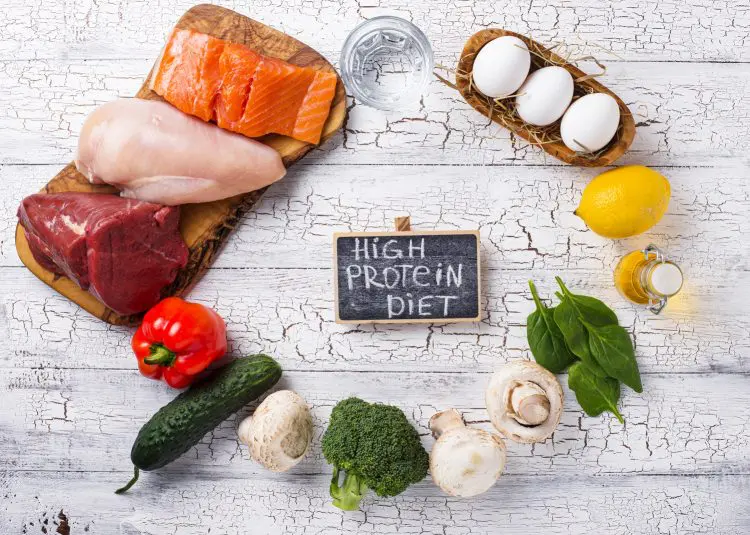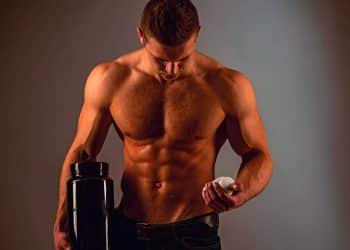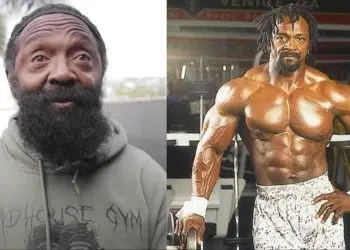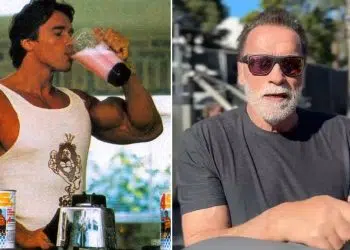Protein is arguably the most important nutrient for people who exercise. That goes double if you are training for strength or muscle growth. Intense training causes muscle catabolism or breakdown.
Your body needs protein and the amino acids it contains to repair that damage and make your muscles bigger and stronger. Too little protein could impede your progress.
How much protein you actually need is up for debate. The RDA (recommended daily amount) for protein is a measly 0.36 grams per pound of bodyweight (1). This is enough to sustain a sedentary person, by probably not enough for a dedicated exerciser.
In contrast, studies suggest that people who train hard and often need more than double the RDA in protein to get the most from their workouts. That means at least 0.72 grams per pound of body weight (2).
A lot of bodybuilders err on the side of caution and consume one gram per pound. This nice round number makes calculating your macros easier. It also ensures that there is protein to spare, eliminating the danger of a deficiency.
Use our protein calculator to estimate your recommended daily intake.
Level Up Your Fitness: Join our 💪 strong community in Fitness Volt Newsletter. Get daily inspiration, expert-backed workouts, nutrition tips, the latest in strength sports, and the support you need to reach your goals. Subscribe for free!
While it is possible to get enough protein from food, it’s not always practical. After all, you may ruffle your boss or teacher’s feathers if you keep chowing down on chicken legs and tuna every few hours.
That’s where protein powders come in.
Protein powder makes getting enough of this critical macronutrient much easier. Just mix up a scoop or two with water and chug it down. Most protein powders provide 20-25 grams of protein per serving, making hitting your daily protein intake goal much easier.
But should you consume your protein shake before or after training? Let’s discuss!
Protein Before Training
Some exercisers like to consume a protein shake before training. The idea is that the shake will help prevent muscle catabolism. And, as the workout comes to an end, the amino acids from the shake will be available to kickstart the processes of muscle repair and growth.
While this concept makes sense on paper, there is no evidence to support it (3). It may even be detrimental to your workout.
Exercise diverts blood away from the digestive system to supply the muscles being trained with more oxygen. This brings the digestive process to almost a complete stop. Protein consumed immediately before exercise will mostly stay in the stomach, where it will remain undigested. It certainly won’t be available for your muscles to use.
Consuming protein before exercise may also cause a spike in insulin and a corresponding drop in blood glucose. This could leave you feeling tired and even affect workout duration and intensity.
Depending on your tolerance for food in your stomach during exercise, this could cause abdominal bloating and stomach upsets. Most people find exercise more comfortable if their stomach is empty.
Related: How Long Should You Wait to Work Out After Eating?
Pre-workout supplements provide energy without bulk and are designed to work very quickly. That’s why they’re usually well-tolerated before exercise. However, they’re more fluid than food, which is why they are digested so fast. Even in the form of a shake, protein is more of a food than a liquid, so it takes longer to digest.
Protein After Training

While some exercisers like to drink a protein shake before training, more tend to consume protein powder after exercise. In fact, because of something called “the anabolic window,” many exercisers will do their very best to drink a protein shake within 30 minutes of completing their workouts.
For most, the protein of choice is whey protein. That’s because it digests quickly and increases post-exercise protein metabolism more than casein and other types of protein powder (4).
However, research suggests that the anabolic window is a lot longer than the 30 minutes that most people believe. In fact, it could last several hours (5). This means that there really is no rush to drink a protein shake immediately after training. Instead, you could have a protein shake or eat a high-protein meal in the hours following your workout.
Level Up Your Fitness: Join our 💪 strong community in Fitness Volt Newsletter. Get daily inspiration, expert-backed workouts, nutrition tips, the latest in strength sports, and the support you need to reach your goals. Subscribe for free!
Read more about the latest research on the anabolic window here.
While your body does need protein after training, it doesn’t appear to matter all that much how soon you consume it and what form it takes. If drinking a protein shake immediately after your workout is convenient, there is no reason not to continue doing so. But, if you’d rather wait a while or eat a solid high-protein meal instead, that will work too.
Daily Protein Intake is More Important Than Nutrient Timing

Studies indicate that getting enough protein every day is much more important than when you consume your protein shakes (7). Using protein powder immediately before and after exercise seems to have the same effects and benefits.
So, don’t worry too much about whether it’s better to consume protein before or after exercise. Instead, focus on what’s convenient.
If you prefer to consume your protein shake before training, and it causes no adverse effects, you should continue to do so. Or, if you like chugging down a protein shake straight after the last set of your workout, there is no reason to stop.
Ultimately, both options can work, and you can choose to do one, both, or neither. What’s MORE important is hitting your daily protein intake target. A protein deficiency will undermine your progress far more than the timing of your protein shake.
For most of us, getting enough protein means consuming high-protein foods at all main meals (breakfast, lunch, and dinner) and then consuming protein-rich snacks between meals.
Good options include tuna and salmon foil packs, beef and turkey jerky, hardboiled eggs, nuts and seeds, and the bodybuilding staple protein shakes.
So, don’t sweat it if you finish your workout only to realize you’ve forgotten your shaker cup or protein powder. Just consume a protein-rich meal or shake whenever it’s convenient. Before you turn in for the night, make sure that you’ve hit your protein intake goal for the day.
Wrapping Up
As bodybuilders, a lot of what we do and believe is based on “bro science.” These are the ideas and beliefs associated with training and nutrition that are not always supported by research.
In some cases, bro-science stands up to scientific scrutiny, and what we believe to be true eventually turns out to be just that. In other instances, “real” science exposes bro-science as incorrect.
It turns out that the anabolic window is bro-science at its best. It makes a lot of sense on paper, but, in reality, it doesn’t exist the way we think it does. In fact, rather than being a narrow period of just 30 minutes, the anabolic window is more like a double-wide garage, lasting several hours.
Protein shake timing is another example of well-meaning but scientifically contested bro-science. It doesn’t matter whether you consume protein shakes before or after training. Instead, just make sure you consume enough protein each and every day. Not getting enough protein will undermine your progress far more than choosing between pre or post-training protein shakes.
References:
1 – Harvard Medical School: How much protein do you need every day? https://www.health.harvard.edu/blog/how-much-protein-do-you-need-every-day-201506188096
2 – British Journal of Sports Medicine: A Systematic Review, Meta-Analysis, and Meta-Regression of The Effect of Protein Supplementation on Resistance Training-Induced Gains in Muscle Mass and Strength in Healthy Adults https://bjsm.bmj.com/content/52/6/376
3 – PubMed: Pre Versus Post-Exercise Protein Intake Has Similar Effects on Muscular Adaptations https://www.ncbi.nlm.nih.gov/pmc/articles/PMC5214805/
4 – PubMed: Whey Protein Supplementation Enhances Whole Body Protein Metabolism and Performance Recovery after Resistance Exercise: A Double-Blind Crossover Study https://www.ncbi.nlm.nih.gov/pmc/articles/PMC5537849/
5 – PubMed: Nutrient Timing Revisited: Is There A Post-Exercise Anabolic Window? https://pubmed.ncbi.nlm.nih.gov/23360586/
6 – PubMed: The Effect of Protein Timing on Muscle Strength and Hypertrophy: A Meta-Analysis https://www.ncbi.nlm.nih.gov/pmc/articles/PMC3879660/
7 – PubMed: Recent Perspectives Regarding the Role of Dietary Protein for the Promotion of Muscle Hypertrophy with Resistance Exercise Training https://www.ncbi.nlm.nih.gov/pmc/articles/PMC5852756/












